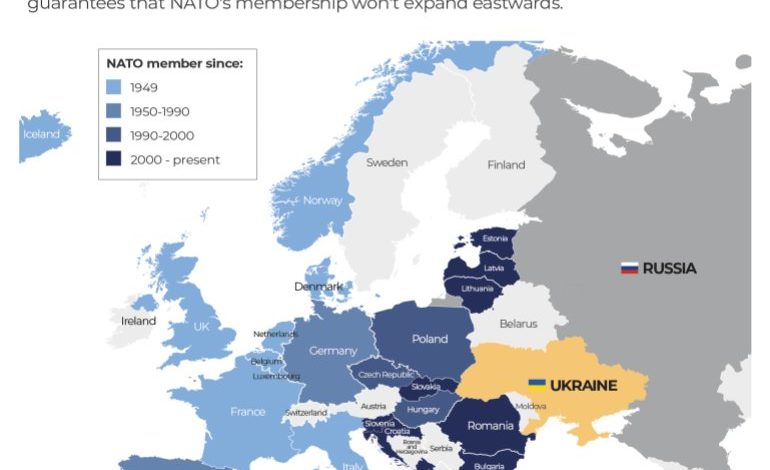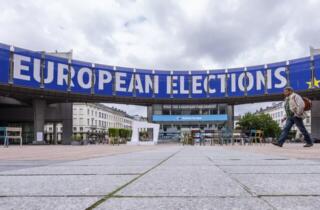
Ukraine: Creating Peace Means Changing the World
by Robert C. Koehler
Only threat, pain and inflicted hell preserve peace, right?
Get the bad guy! Russia: bad. If it invades Ukraine, such a “voluntary war of aggression,” according to David Leonhardt of the New York Times, “would be a sign that Putin believed that Pax Americana was over and that the U.S., the European Union and their allies had become too weak to exact painful consequences.”
What a wonderful — simple — world we live in. And the primary goal of every military-industrial acolyte is to make sure it stays simple: good vs. evil, us vs. them, God vs. Satan. Yeah, nuclear weapons are kind of dangerous, and simmering Third World countries (Iran comes to mind) should be prevented from developing them, but our nukes maintain Pax Americana, as does every war of aggression we’ve ever undertaken. They’ve all been necessary, at least at the time, after which it’s best just to forget about them and move on.
God help us, I cry. This remains the geopolitical status quo, or the “malignant normality,” as Kelly Denton-Borhaug puts it:
While at least $6 trillion dollars were spent on this country’s post-9/11 wars,” she writes,
“crucial issues like climate change and medical care for the elderly and the rest of us are treated with a bake-sale mentality by our lawmakers, with precious little questioning of that reality. Are our leaders afraid of the weapons-making titans of the military-industrial complex (of which they are increasingly a part)? Do they really believe that this is the way to build a more secure world?”
Is this the geopolitical mindset in which we’re stuck? War — or “defense” — seems to be the easiest way for governments to corral public consensus. It’s sacred to the masses and it’s lucrative as hell to the military-industrialists. No matter it goes against every religious teaching on the planet. No matter we reap what we sow. No matter that nuclear weapons are present and unavoidably part of the looming Russia-Ukraine/NATO confrontation. War, or the threat of war, is seen — and reported in the mainstream media — as the only option. Diplomacy is quickly shrugged off, because it involves listening and making concessions.
“Desperately needed is a new European security framework, to demilitarize and defuse conflicts between Russia and U.S. allies,” writes Norman Solomon:
“But the same approach that for three decades pushed to expand NATO to Russia’s borders is now gung-ho to keep upping the ante, no matter how much doing so increases the chances of a direct clash between the world’s two nuclear-weapons superpowers.”
Norman Solomon
Here’s what’s missing: an empowered peace process. In the planet’s malignant normalcy, power means only one thing: domination. And domination requires not merely force but spiritual stupidity, e.g., when killing is called “war,” it’s always justified. And despite what Pogo once claimed, the enemy is not us. The enemy is different from us: cruel and two-dimensional, interested only in taking what belongs to us.
This attitude may end life on Planet Earth. But is there an alternative? If there is — and I believe there is — it begins with a collective human shift in awareness: an understanding that we are all connected, and that cooperation, between individuals and between nations, is a complex process of becoming the best of who we are.
To grasp what this means, I reach back nearly a century, to an extraordinary essay written in 1925 by management consultant Mary Parker-Follett. It’s called “Constructive Conflict.”
Her basic point is this: There are three primary ways in which we deal with conflict — every kind of conflict, whether an argument between neighbors or a dispute between nations. The most obvious is domination. One side wins, one side loses. It may seem like a solution, but usually collapses in the long run, “as we can see,” she notes, “from what has happened since the war.” She’s referring, of course, to World War I.
The second way is called compromise. Both sides give, neither gets what it wants, but life goes on, at least for a while. Nobody’s out in the streets cheering wildly in support of compromise. When domination — victory — is the only other option, it’s easy to see how this revs up the marching band and gets the flags waving.
But there is a crucial third option, which requires a complete social reset, a demilitarization of the whole process, just as Norman Solomon was calling for. Parker-Follett calls it integration: That is to say, both sides speak honestly and openly about their concerns and needs; and they listen to the other side — with respect, not contempt. Then they reach not for compromise but insight. How can both sides get their needs met? What this involves, she points out, is creating something that does not yet exist.
“As conflict — difference — is here in the world, as we cannot avoid it, we should, I think, use it,” she writes. “Instead of condemning it, we should set it to work for us. . . . The transmission of power by belts depends on friction between the belt and the pulley. The friction between the driving wheel of the locomotive and the track is necessary to haul the train. All polishing is done by friction. The music of the violin we get by friction.”
Parker-Follett
All of which adds up to this, regarding Ukraine: Both sides in the matter are flawed, and both sides need to listen. Here are two of the points that could emerge if we listened to Russia, as described at Democracy Now!:
1. The Soviet Union lost 27 million people in World War II. “There is a real continuing fear, even in younger generations, about being encircled,” according to Katrina Vanden Heuvel. Russia is deeply troubled by the expansion of NATO to its borders and the threat of NATO admitting Ukraine. The Ukrainian military is on high alert and the U.S. has been pouring troops and weapons into the region.
2. “About 30 percent of Ukraine’s 50 million citizens are native Russian speakers, most in the southeast region of Donbas bordering Russia and on the Crimean Peninsula,” as Amy Goodman and Denis Moynihan write:
“The national debate on whether to align with East or West erupted into a military conflict, with close to 14,000 people killed, 1.5 million displaced, and two regions within the Donbas, Donetsk and Luhansk, declaring independence from Ukraine and aligning with Russia.”
Democracy Now
The only thing obvious about any of this is that war will make it worse. What can all sides, working together, create to turn it into peace?
Robert Koehler (koehlercw@gmail.com), syndicated by PeaceVoice, is a Chicago award-winning journalist and editor. He is the author of Courage Grows Strong at the Wound.




